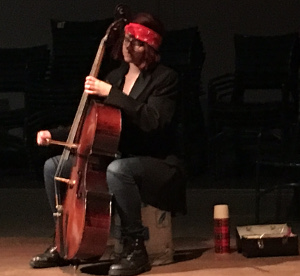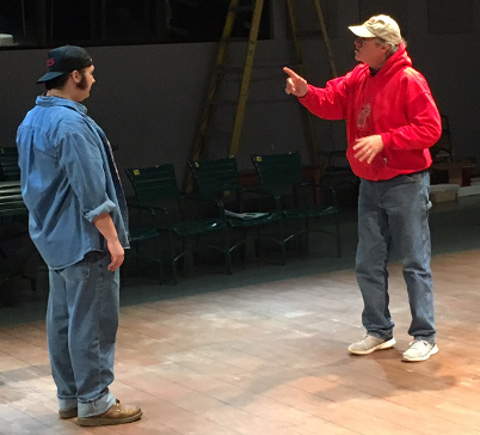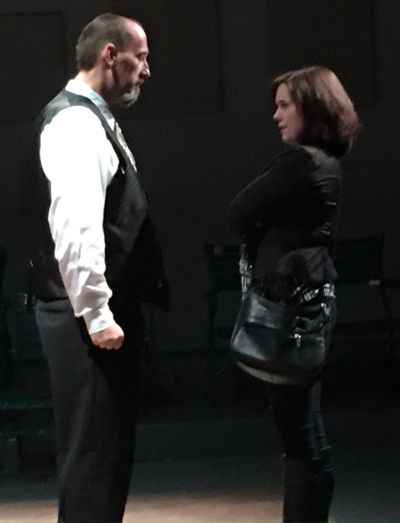Goodwill mentoring program stands ready
- Details
- Published on 12 January 2017
- Written by The Peorian
 January is National Mentoring Month, and this year Goodwill is celebrating 15 years of the national mentoring movement by expanding quality mentoring opportunities to connect more of our community's young people with caring adults.
January is National Mentoring Month, and this year Goodwill is celebrating 15 years of the national mentoring movement by expanding quality mentoring opportunities to connect more of our community's young people with caring adults.
According to Opportunity Index (2013), one in seven young people ages 16 to 24 is disconnected from school and work. Goodwill is helping area youth overcome disadvantages, avoid delinquency and achieve success through the Goodwill GoodGuides® youth mentoring program. The effort is part of a national program that helps youth finish school and transition into productive careers with the guidance of trusted adults.
"Goodwill has a long history of assisting people to achieve the skills they need to help them find jobs," said Jim Gibbons, president and CEO of Goodwill Industries International. "A crucial part of that history is making sure that families are strong. GoodGuides helps keep youth who are at risk on a path toward a better future. That's good for our youth and our communities."
The GoodGuides program is made possible through a $3 million grant to Goodwill Industries International from the U.S. Department of Justice, which is invested in 13 local communities across the nation, including Peoria and Springfield, as well asBoston, Massachusetts, New Orleans, Louisiana, Scranton, Pennsylvania,; Dayton, Ohio,; Astoria, New York; Dallas, Texas; Denver, Colorado; Greenville, South Carolina; Johnstown, Pennsylvania; Orlando, Florida, and Spokane, Washington.
The GoodGuides national youth mentoring program is designed to help youth ages 12 to 17 prepare for school completion, develop work skills, identify career paths, and transition to post-high school activities, including post-secondary training and productive work. Most importantly, mentors serve as trusted and reliable resources to help mentees fulfill their goals and find job success.
In local communities across the nation, GoodGuides is having a positive impact on the lives of youth as well as the adult mentors who volunteer to work with them.
Since 2009, GoodGuides has served more than 11,400 youth, trained and supported more than 6,700 mentors, and invested more than 667,100 mentoring hours in communities across the nation.
For more than 110 years, Goodwill Industries International's network of 163 independent, community-based organizations have helped youth overcome disadvantaging conditions through financial education, mentoring and job-readiness skills training, including résumé writing and interview preparation.
If you would like to volunteer to be a mentor or know of a young person who would benefit from this program, please visit goodwill.org.
Where's the bar? Can't that wait?
- Details
- Published on 12 January 2017
- Written by The Peorian
Interviews are vulnerable times. There aren't many things more nerve-wracking than walking into a room of people you desperately want to impress.
In a new survey from CareerBuilder, employers shared the most memorable job interview mistakes candidates have made and how body language can hinder their chances of moving forward in the interview process.
According to the nationwide survey, conducted online by Harris Poll on behalf of CareerBuilder from Nov. 16 to Dec. 6, 2016 among more than 2,600 hiring and human resource managers, it doesn't take long for a hiring manager to make a decision. Around half of employers (51 percent) know within the first five minutes of an interview if a candidate is a good fit for a position — on par with last year (50 percent).
"The best solution to minimize pre-interview anxiety is solid preparation," said Rosemary Haefner, chief human resources officer for CareerBuilder. "If you don't read about the company and research your role thoroughly, you could magnify your fear of interviewing poorly and lose the opportunity."
The Strangest Things People Have Done in Job Interviews
When asked to share the most unusual things job candidates have done during the interview process, employers and hiring managers recalled the following:
- Candidate asked to step away to call his wife to ask her if the starting salary was enough before he agreed to continue with the interview.
- Candidate asked where the nearest bar was located.
- Candidate brought his childhood toys to the interview.
- Candidate ate a pizza he brought with him (and didn't offer to share).
- Candidate asked interviewer why her aura didn't like the candidate.
- Candidate invited interviewer to dinner afterwards.
- Candidate stated that if the interviewer wanted to get to heaven, she would hire him.
- Candidate ate crumbs off the table.
- Candidate said her hair was perfect when asked why she should become part of the team.
- Candidate sang to a song on the radio playing overhead.
- Candidate bragged about the fact that they were in the local newspaper for allegedly stealing a treadmill from an older woman's house.
- Candidate put on and took off her sunglasses repeatedly.
Body Language: Master Your Mannerisms
In a job interview, it's likely that your body language will have more of a positive impact on your success than anything you say. When asked to identify the biggest body language mistakes job seekers make during an interview, hiring managers named the following:
- Failing to make eye contact: 67 percent
- Failing to smile: 39 percent
- Playing with something on the table: 34 percent
- Fidgeting too much in their seats: 32 percent
- Crossing their arms over their chests: 32 percent
- Having bad posture: 31 percent
- Playing with their hair or touching their faces: 28 percent
- Having a weak handshake: 22 percent
- Using too many hand gestures: 13 percent
- Having a handshake that was too strong: 9 percent
Easiest Ways to Ruin a Job Interview
What are the absolute worst things you can do when interviewing for a job? Here are five instant deal breakers, according to employers:
- Candidate is caught lying about something: 66 percent
- Candidate answers a cellphone or text during the interview: 64 percent
- Candidate appears arrogant or entitled: 59 percent
- Candidate dresses inappropriately: 49 percent
- Candidate appears to have a lack of accountability: 48 percent
Survey Methodology
This survey was conducted online within the U.S. by Harris Poll on behalf of CareerBuilder among 2,605 hiring and human resource managers ages 18 and over (employed full-time, not self-employed, including 2,391 in the private sector) between November 16 and December 6, 2016. With a pure probability sample of 2,605, one could say with a 95 percent probability that the overall results have a sampling error of +/- 1.92 percentage points.
Adequate sleep, normal patterns maintain brain health
- Details
- Published on 11 January 2017
- Written by The Peorian
If you want to maintain your brain health as you age, then get the recommended seven to eight hours of sleep per day, according to a new consensus report issued today by the Global Council on Brain Health (GCBH). The expert recommendations include a wealth of information and practical tips for all adults age 50-plus to improve and maintain healthy sleep habits.
A recent AARP consumer survey found that 99% of adults age 50-plus believe that sleep is important for their brain health, but over four in 10 (43%) say they don't get enough sleep. More than half (54%) of adults report they wake up too early in the morning and can't get back to sleep.
"We know how many questions adults have about how much sleep is enough, and the role that sleep plays in brain health and cognitive function," said Marilyn Albert, Ph.D., GCBH Chair, Professor of Neurology and Director of the Division of Cognitive Neuroscience at Johns Hopkins University in Baltimore, Maryland. "This report answers a lot of these questions and we hope it will be a valuable source of information for people."
The new recommendations cover a wide range of sleep-related issues, including common factors that can disrupt sleep, symptoms of potential sleep disorders, and prescription medications and over-the-counter (OTC) sleep aids. A host of helpful expert tips are also included in the report, such as ways to help fall asleep or stay asleep, when to seek professional help for a possible sleep disorder, and the pros and cons of napping.
Consensus Statements
Based on the scientific evidence, the GCBH made the following consensus statements:
- Sleep is vital to brain health, including cognitive function, and sleeping on average 7-8 hours each day is related to better brain and physical health in older people.
- The sleep-wake cycle is influenced by many different factors. A regular sleep-wake schedule is related to better sleep and better brain health. Regular exposure to light and physical activity supports good sleep.
- People, at any age, can change their behavior to improve their sleep.
- Persistent, excessive daytime sleepiness is not a normal part of aging.
- Sleep disorders become more common with age, but can often be successfully treated.
- People with chronic inadequate sleep are at higher risk for and experience more severe health problems, including dementia, depression, heart disease, obesity and cancer.
Practical Tips and Advice
The following are just a sample of tips included in this report:
- Get up at the same time every day, seven days a week.
- Restrict fluids and food three hours before going to bed to help avoid disrupting your sleep to use the bathroom.
- Avoid using OTC medications for sleep because they can have negative side-effects, including disrupted sleep quality and impaired cognitive functioning.
- Dietary supplements such as melatonin may have benefits for some people, but scientific evidence on their effectiveness is inconclusive. Be particularly cautious of melatonin use with dementia patients.
- Avoid long naps; if you must nap, limit to 30 minutes in the early afternoon.
"Although sleep problems are a huge issue with older adults, it's unfortunate the importance of sleep is often not taken seriously by health care professionals," said Sarah Lock, AARP Senior Vice President for Policy, and GCBH Executive Director. "It's normal for sleep to change as we age, but poor quality sleep is not normal. Our experts share the steps people can take to help maintain their brain health through better sleep habits," said Lock.
The GCBH, founded in 2015, is an independent international group of scientists, health professionals, scholars and policy experts working on brain health issues. Convened by AARP with support from Age UK, the goal of the GCBH is to review the current scientific evidence and provide recommendations for people so that they can maintain and improve their brain health.
The full GCBH recommendations can be found here: www.globalcouncilonbrainhealth.org
The 2016 AARP Sleep and Brain Health Survey can be found here: www.aarp.org/sleepandbrainhealth
Fantasy, suspense, humor: 'Evening of One Acts' open at Corn Stock
- Details
- Published on 11 January 2017
- Written by Paul Gordon

From a rather odd combination of fantasy and realism to a heavy dose of the macabre and finally to comedic reality, the three plays will leave audiences pondering how they themselves might have handled these situations.

“It starts out with a couple guys taking their lunch break at the construction job. What follows is a combination of realism and poetry, theatricality and fantasy. It’s a very sweet play, really,” Day said.
His cast is headed by local community theatre veteran Charles Brown, who is as comfortable reciting Shakespeare as he is performing in contemporary musicals. He turns the Old Man into director and teacher while showing the Angry Young Man, portrayed by Cullen Baker, how letting his imagination work can be life-changing.
The Old Man enlists the help of Blue Jeans, portrayed by Hannah Shelby, to make the fantasy complete.
Day said he wanted to direct the play, written by Dan Wright, for many years after seeing it performed elsewhere. However, he was unable to find the script, until recently. “I’m glad I did it. This is one of those plays that is really good food for the soul,” he said.

This play has been called an inspiration of Alfred Hitchcock and Rod Serling and once the audience uses the imaginative tricks dealt by director Celeste Wohl it will shudder while thinking about the “what-if.”
The two-person drama draws forth the talents of Liz Scoville and Chris Peterlin and uses other dark ways to keep audience members on the collective edge of their seats.
“I’m the kind of director who loves to make an emotional connection with the audience and I love suspense. If we’ve done our job well, we’ll have a very creepy show,” Wohl said. “It’s a Hitchcockian-style drama that that have you walking away looking over your shoulder.”
The play is set in a huge Colonial mansion where we learn there has been brutal murders. The fact nobody was ever arrested for it adds to the tension as real estate agent Ms. Haviland, portrayed by Scoville, walks her client Dr. Simean, portrayed by Peterlin, through the house – after the bodies have been removed, of course.
“A show like this can be very hard on the cast because I am asking them to be very vulnerable and very dark, which calls for a depth many actors don’t have. But these two do,” Wohl said.

That includes revealing long-held secrets their characters, Bea and Frank, have learned to live with for 32-plus years.
“Nathan and Lynne were naturals from the very first audition. I could not have asked for better,” said DeVore, who is making her Peoria directorial debut after many years in South Carolina.
This is a play that will quickly engage the audience, particularly those who have themselves have resorted to meddling in order to keep their children happier than they themselves have ever been. But the play still leaves the audience guessing whether the decision to bare their souls was worth it.
Joining Irwin and Grimson are Rachel Hayes and Rustin Ledford as Joan and Richie, respectively. “I am thrilled with my cast. They’ve worked very hard,” she said.
Ledford joined the cast late because of an original cast member became ill.
“An Evening of One Acts” starts at 7:30 p.m. on Jan. 13, 14, 19, 20, and 21 and at 2:30 p.m. on Jan. 22. Tickets are $12 for adults and $8 for students and can be reserved by calling 676-2196.
Doc Watson: A primer on the Siberian Husky
- Details
- Published on 10 January 2017
- Written by Doc Watson
Many of you have heard me talking about my Siberian Husky dogs on the air. Some of you have seen me walking some combination of them over the years in North Peoria. We have three currently.
Our oldest, Sky, is 12 years old and came into our lives when we purchased our first set as Christmas gifts for our kids in 2004. My wife’s mom was living with us, nearing the end of her 4-year battle with cancer, and we were too exhausted to Christmas shop that year! His brother, Dakota, died unexpectedly, a couple months short of his 9th birthday, due to a brain tumor that was pushing against his nasal cavity. We thought we would get Sky a running mate some months down the line, but only lasted three, sad weeks before re-upping with another totally adorable set of husky puppies, Vance and Saber, three years ago.
I tallied up the mileage from our 2016 walks recently and the total was 177.3 miles, about the distance from Peoria to Chicago. They are an active, lovable breed and like to be walked. That’s why I think they should be bought in pairs, so they have a buddy to play, run and wrestle with. Also, if you’re thinking about owning a husky, know that they are expert escape artists. Our first pair learned they could leap over our four-foot chain link fence like a deer, so we had to sleeve over it with larger poles and install a six-foot fence.
The other morning, with my jaw still emanating pain from having a molar pulled the day before, I was walking my three boys in zero-degree wind chill weather. One car pulled up next to me, wanting to talk. Usually, I’m chatty and an ambassador for Huskies and dog ownership, in general. Not so much this morning, as the wind ripped through my cheeks, drawing tears.
So, in the interest of saving myself from frostbite on days like this and not wanting to seem reticent, here are some common answers I give to questions fielded while walking the huskies, some borrowed from the website Indy Homes for Huskies,a Siberian Husky rescue dog operation in Indianapolis, just a four hour drive from here. If we ever want another dog, we’ll adopt one from there or our local Peoria County Animal Protection Services, formerly called PAWS, as we did with our first dog and cat we adopted in 1998.
Below are some common responses I give to Frequently Asked Questions about huskies
.
- They are huskies, not wolf dogs. We had a wild, part-wolf dog, Sparky, given to us by our Toledo babysitter when we arrived in Peoria, but the pound said wolf-breeds are illegal in this state. Sparky went to heaven too soon.
- Huskies are not Alaskan Malamutes, a slightly larger, thicker-haired, similar-looking breed.
- No, they don’t bite, but they might jump on you. They like people.
- Yes, they are walking me.
- No, their pulling is actually not lack of training. They were bred to be that way. They do settle down and pull less about a half mile into our walks.
- Ours cost around $300 per dog and are cheaper when you don’t require their papers (for breeding, which we had no intention of doing with them)
- Yes, I’ve seen Snow Dogs, made me cry. Cuba Gooding Jr. is one fine actor.
- Both our breeders were from western Illinois and found by my wife on the internet. Both said they were on their last litter and not breeding any more.
- No, not all huskies have blue eyes, and their hair is not always black and white.
- Yes, there are other breeds of blue-eyed dogs. Our first Peoria pound dog, Chance, had beautiful blue eyes. She was a mutt.
- They don’t bark much, but like to howl – or “talk” as we prefer to think.
- No, I don’t want to sell them or breed them with your dog.
- Yes, they shed – a lot. We were told by the breeder that they’d have one big “blow out” each year. Not true; ours shed year round.
Hope this helps. They are wonderful dogs, very adorable, and show just the right amount of affection. I wouldn’t recommend them unless you have a fenced-in yard. Our vets have said they should never be allowed out without a leash on, as they will run and run when they get loose. It’s frightening when it happens and our family goes into serious DEFCON recovery mode.
On one occasion, our original pair, Sky and Dakota, were not found by us. They ran across busy University Avenue, we’re told, and eventually crossed back and were discovered by a couple neighborhood young girls who had seen them on our walks. They returned them to us, but it was very scary!














































